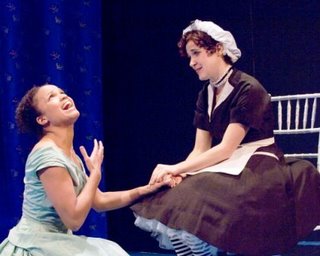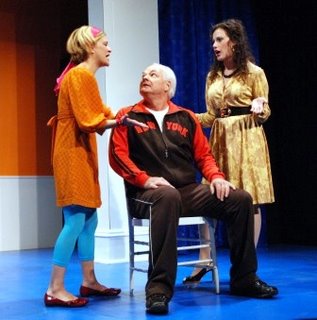 Patterson’s adaptation is satisfying, if only because there’s a dearth of Molière right now. Her all-female cast, gimmick or no, does well (particularly Virginia Baeta and Amy Driesler), but it adds nothing to the show, and while the addition of musical interludes manages to compress whole acts into minutes, did we need the cheesy lip synching to Tina Turner’s “Simply the Best” or Cher’s “Gypsies, Tramps & Thieves”? Luckily, the show’s maintained the classic stock characters, and Carey Urban steals every scene she’s in (as a good Columbina should). Jenny Fulton’s costumes help to immediately establish character (great for actors playing dual roles), but then again, why doesn’t anybody wear shoes? Which doctor told the great hypochondriac Argan to do that? Despite this director’s meddling, Molière shines through the dull translation, and the performances carry the day.
Patterson’s adaptation is satisfying, if only because there’s a dearth of Molière right now. Her all-female cast, gimmick or no, does well (particularly Virginia Baeta and Amy Driesler), but it adds nothing to the show, and while the addition of musical interludes manages to compress whole acts into minutes, did we need the cheesy lip synching to Tina Turner’s “Simply the Best” or Cher’s “Gypsies, Tramps & Thieves”? Luckily, the show’s maintained the classic stock characters, and Carey Urban steals every scene she’s in (as a good Columbina should). Jenny Fulton’s costumes help to immediately establish character (great for actors playing dual roles), but then again, why doesn’t anybody wear shoes? Which doctor told the great hypochondriac Argan to do that? Despite this director’s meddling, Molière shines through the dull translation, and the performances carry the day.  A little Molière goes a long way, but for Charles L. Mee, not far enough. His production, shruggingly directed by Eric Parness, tries character after character to make something happen, but it’s not funny, and it’s not clever. (It’s a Chekhovian comedy—more tragic than funny.) Our show opens with Argan (John Henry Cox) working out at the behest of his two lesbian (why not?) trainers (Vivia Font and Lori McNally). This Argan isn’t sick: why, he’s just purchased a nice Asian mail-order bride named June (Sue Jean Kim). Pulling more from Tartuffe and School for Wives, Mee quickly reveals that June is in love with another man and then, as if out of ideas, decides to have June’s lover, Horner, sing about being a castrato, and then to have June get a bull-dyke makeover which involves her rapping and swinging around a nunchaku while in combat boots. Sure, whatever. Considering how rich even the subplot of The Imaginary Invalid is, it’s amazing that this play, which is all lackluster subplot, got produced.
A little Molière goes a long way, but for Charles L. Mee, not far enough. His production, shruggingly directed by Eric Parness, tries character after character to make something happen, but it’s not funny, and it’s not clever. (It’s a Chekhovian comedy—more tragic than funny.) Our show opens with Argan (John Henry Cox) working out at the behest of his two lesbian (why not?) trainers (Vivia Font and Lori McNally). This Argan isn’t sick: why, he’s just purchased a nice Asian mail-order bride named June (Sue Jean Kim). Pulling more from Tartuffe and School for Wives, Mee quickly reveals that June is in love with another man and then, as if out of ideas, decides to have June’s lover, Horner, sing about being a castrato, and then to have June get a bull-dyke makeover which involves her rapping and swinging around a nunchaku while in combat boots. Sure, whatever. Considering how rich even the subplot of The Imaginary Invalid is, it’s amazing that this play, which is all lackluster subplot, got produced. If this play has a saving grace—a big if—it’s the actors playing the two squabbling daughters, Melissa Miller and Susan Louise O’Connor. These two manage to look like they enjoy being in this show and even show some depth. Some actors, like Jarel Davidow, have less time to establish themselves, but that’s hardly an excuse. (Booth Daniels manages to give his nerdy Cleante a little character.) Suffice to say that after enduring Horner’s awful song about being a castrato and watching the cast shuffle around to the canned music of a bad high school show, it’s hard to take pleasure in even the good parts of Mee’s work.
Molière wrote his play to be a polemic against the then-foolish medical profession. The Mail Order Bride is either the sort of kooky, half-cooked idea that one of these doctors would have come up with or an unintentionally successful cure for the common laugh: you won’t be chuckling. Bottom line: this isn’t Molière. The Imaginary Invalid is at least a passable romp, with lively, energetic actors, but it lacks the subtlety and the build of the unabridged, rhyming version: so please, don’t fix what ain’t broken.

2 comments:
Dear Mr. Riccio,
Congratulations. Your complete misinformation manages to discredit you entirely. First of all, The Imaginary Invalid was not written in "beautiful rhyming couplets" as you put it. In this final satire, Moliere wrote in prose. Also, if you consulted with the text, you would realize that not much has been cut; it is a short piece. And finally, Moliere did indeed include at the time contemporary musical interludes. Of course you are entitled to your opinions, but work on getting your facts straight.
Sincerely,
Eric Parness
Artistic Director
Resonance Ensemble
I suppose I owe some sort of apology, if only for the translation I went to, that of Mr. Thomas Mooney. Moliere did write the original in prose (he also wrote the end in Latin), and this translator chose to translate back into rhyming couplets to make it "more similar" to the type of rhythm more familiar in a Moliere play. The same goes for the "contemporary musical" interludes, written out of my source material. I wish I'd had a copy of your translation so I could've more accurately compared my review with what your dramaturg prepared, but unfortunately, freelancers rarely get proper review material. In any case, I guess the main point would be, then, that in Moliere's time, "contemporary music" was far more bearable and relevant to pacing (as Shakespeare used music in some of his plays, like "Twelfth Night"). Also, while I don't attest to having seen any of Moliere's work, I'd like to think it wasn't quite as hammed up as it was in your production, especially since (to me) there seemed to be little artistic merit in doing so.
I do appreciate you clarifying my incorrect source material, and I wish you the best of luck in future productions.
-Aaron Riccio
Post a Comment